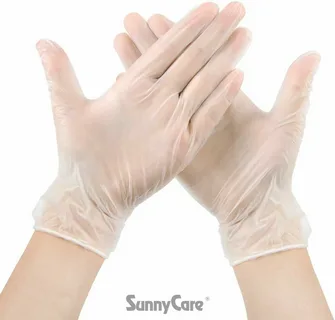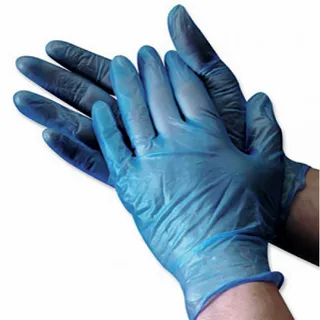Vinyl Powder Free Gloves, also known as disposable Vinyl-Gloves, are essential for maintaining hygiene and preventing the spread of infections. They are widely used in various industries, such as healthcare, food service, and cleaning. The powder-free feature of these gloves eliminates the risk of contamination and allergic reactions, making them a preferred choice for many professionals.
What Are Vinyl Powder-Free Gloves?
Vinyl powder-free gloves are synthetic protective equipment designed to protect hands from direct contact with hazardous substances, microbes, and potential irritants. They are made from polyvinyl chloride (PVC), a plastic derivative, and do not contain powder additives, such as cornstarch, which are commonly used in other types of disposable gloves to make them easier to put on.
The absence of powder in these gloves not only reduces the risk of allergic reactions for users but also prevents cross-contamination that could occur from powder residues. This is especially important in environments requiring strict hygiene protocols, such as medical facilities and food processing units.
The design and manufacture of vinyl powder-free gloves focus on creating a barrier that is less permeable to viruses and bacteria, ensuring a high level of hygiene and safety for both the wearer and the subjects of their work. Despite being disposable, these gloves are engineered to offer a balance of flexibility and durability, providing a snug fit and a reasonable degree of tactile sensitivity.
The Advantages of Using Vinyl-Gloves
Vinyl-Gloves present many benefits that underline their popularity across diverse sectors. These gloves stand out for their cost-effectiveness, offering a budget-friendly alternative to their latex and nitrile counterparts without compromising on the basic protective features required in environments that demand high hygiene standards.
The inherent hypoallergenic properties of Vinyl-Gloves cater to a significant portion of the workforce prone to latex allergies, providing a safe and comfortable protective solution. Comfort is another pivotal advantage; these gloves are designed to accommodate prolonged wear, ensuring that individuals can perform their tasks without discomfort or hindrance.
Furthermore, Vinyl-Gloves exhibit a commendable level of durability, with a resistance to punctures and tears that makes them suitable for various activities, from healthcare procedures to culinary preparation. This amalgamation of affordability, hypoallergenic characteristics, comfort, and durability solidifies the position of Vinyl-Gloves as an indispensable tool in maintaining cleanliness and safeguarding against contamination in numerous professional settings.
Understanding the “Powder-Free” Feature
The “Powder-Free” feature in Vinyl-Gloves is a critical advancement to enhance user safety and maintain to enhance user safety and maintain cleanliness in various professional settings. By forgoing powder additives, such as cornstarch, these gloves significantly lower the risk of provoking allergic reactions among wearers. This is particularly beneficial in environments where the health and well-being of both staff and clients are of utmost importance, such as in the healthcare and food processing industries.
Furthermore, the absence of powder reduces the likelihood of cross-contamination, a paramount concern in fields demanding stringent hygiene standards. When residues from powdered gloves are left on surfaces or become airborne, they can compromise sterile conditions and contaminate food products, leading to potential health hazards.
The powder-free design of these Vinyl-Gloves thus serves a dual purpose: safeguarding against allergic reactions and ensuring a cleaner, safer environment for handling sensitive materials. This characteristic reflects the commitment to safety and hygiene and underscores the adaptability of Vinyl-Gloves to meet the evolving requirements of various professional sectors.
Vinyl-Gloves vs Latex and Nitrile Gloves
Compared to latex and nitrile variants, Vinyl-Gloves offer distinct benefits and limitations that cater to different user needs and applications. One of the primary distinctions lies in their material composition. Latex gloves, derived from natural rubber, provide superior elasticity and fit, offering enhanced tactile sensitivity that is highly valued in medical procedures. However, some individuals’ potential for allergic reactions significantly limits their universal appeal.
Vinyl-Gloves, made from polyvinyl chloride, stand out due to their inherent hypoallergenic properties and cost-effectiveness. They are an adequate barrier against basic contaminants, making them suitable for non-hazardous tasks and environments where frequent glove changes are necessary.
While they may not match the level of chemical resistance and tactile sensitivity provided by nitrile and latex gloves, respectively, their affordability and lower risk of allergic reactions render them a practical choice for various sectors, including food service and general housekeeping. This comparative analysis underscores the importance of selecting the appropriate glove type based on the specific requirements of the task at hand and the wearer’s sensitivity to glove materials.
 Correct Usage of Vinyl Gloves
Correct Usage of Vinyl Gloves
To ensure the effectiveness and safety of Vinyl Gloves, users must adhere to proper usage guidelines. Initially, one should meticulously inspect the gloves for any signs of damage, such as tears or punctures, which could compromise their protective barrier. If defects are detected, the gloves should be discarded immediately to prevent potential contamination or exposure to harmful substances.
When donning Vinyl-Gloves, it’s advisable to have clean, dry hands to maintain optimal hygiene levels. After use, especially after contact with infectious materials or contaminants, gloves should be carefully removed and disposed of properly, followed by thorough hand washing to eliminate any residues or microbes that may have been in contact with the gloves’ exterior.
Users are cautioned against unnecessarily touching their faces or other objects while wearing gloves, as this can facilitate the transfer of contaminants. Additionally, gloves should be changed regularly and not be reused to prevent cross-contamination and ensure maximum protection against pathogens and other hazardous materials.
Maintenance and Storage Tips
Proper maintenance and storage are critical for preserving the integrity and effectiveness of Vinyl-Gloves. Certain practices should be followed to ensure these protective tools retain their properties and are ready for use when required. Gloves should be kept in a cool, dry environment, shielded from the damaging effects of direct sunlight and extreme temperatures, which can degrade the material over time.
Storing gloves away from chemicals is paramount, as exposure can lead to material breakdown, compromising their protective capabilities. Similarly, keeping them away from sharp objects is essential to avoid punctures or tears before usage. It is also advisable to take note of the manufacturer’s expiry date indicated on the packaging, as materials can deteriorate and lose their effectiveness beyond this period.
Once gloves are used, they must be disposed of in an appropriate waste bin to prevent potential health risks. Adhering to these storage and maintenance guidelines contributes significantly to the longevity and performance of Vinyl-Gloves, ensuring they remain a dependable option for protection in various settings.
Compliance and Safety Standards
Ensuring Vinyl-Gloves meet rigorous compliance and safety standards is crucial for their effectiveness and reliability in protecting users across various industries. Here are five essential standards that these gloves are typically evaluated against:
EN455 Standards
These are specific to medical gloves, covering aspects such as freedom from holes, physical properties, and biological evaluation. Vinyl-Gloves used in healthcare settings are assessed to ensure they meet these critical requirements for safety and performance.
EN374 Standards
Focused on gloves that protect against chemicals and micro-organisms, these standards evaluate the glove’s resistance to chemicals and permeation rates. For environments dealing with hazardous substances, adherence to these standards is vital.
ASTM D5250
This standard specifies the performance requirements for poly (vinyl chloride) gloves for medical applications in the United States. It includes criteria for physical dimensions, properties, and defect levels.
Food Contact Regulations
Gloves used in food handling and processing must comply with regulations, ensuring they are safe for food contact. These include EU Regulation 10/2011 and FDA 21 CFR 177.2600 in the United States, stipulating that materials must not transfer harmful substances to food.
ISO 13485
While not specific to gloves, this standard outlines requirements for a comprehensive quality management system for designing and manufacturing medical devices. Manufacturers of Vinyl-Gloves for medical applications often ensure compliance to bolster quality assurance and user safety.
Innovations in Disposable Vinyl Gloves Technology
In recent years, innovations in Disposable Vinyl Gloves technology have focused on improving their performance, comfort, and sustainability. One notable advancement is the development of enhanced formulations that address traditional drawbacks such as reduced elasticity and durability. New manufacturing techniques have allowed for the creation of Vinyl-Gloves with improved tensile strength and tear resistance, making them more suitable for tasks requiring prolonged wear and higher levels of protection.
Additionally, advancements in polymer blending have resulted in Vinyl-Gloves that offer better tactile sensitivity and a closer fit to the hand. This improvement enhances agility and comfort, making them a viable option for general use and more specialized applications in healthcare and food handling industries where precise hand movements are crucial.
Furthermore, there has been a growing emphasis on sustainability in glove production. Innovations in vinyl glove technology include the development of eco-friendly materials and manufacturing processes that reduce environmental impact. This includes using recycled materials in glove production and implementing more efficient manufacturing practices to minimize waste and energy consumption.
Cost-Benefit Analysis of Vinyl-Gloves
Vinyl-Gloves are widely used across various industries, including healthcare, food service, and cleaning, primarily due to their affordability compared to other glove materials like latex or nitrile. From a cost-benefit perspective, Vinyl-Gloves offer several advantages and considerations.
Firstly, Vinyl-Gloves are typically cheaper than latex or nitrile gloves, making them a cost-effective choice, especially for applications that require frequent glove changes or disposable use. This affordability allows businesses to manage operational expenses effectively without compromising hygiene standards.
However, it’s essential to weigh these benefits against certain limitations. Vinyl-Gloves are generally less durable and puncture-resistant than latex or nitrile gloves. This can lead to a higher risk of tearing or puncturing during use, potentially compromising protection against contaminants or chemicals. For industries requiring high levels of security, such as healthcare or laboratories handling hazardous materials, this reduced durability may necessitate more frequent glove changes, offsetting initial cost savings.
Conclusion
Vinyl Powder Free Gloves are essential for maintaining hygiene and safety across industries due to their versatility, affordability, and hypoallergenic nature. They protect against contaminants and chemicals in healthcare, food handling, and other sectors. Adherence to proper usage and disposal guidelines is vital to mitigate risks effectively and uphold stringent health standards. Their latex-free composition suits individuals with latex allergies, ensuring a comfortable fit and reliable barrier against pathogens. Overall, Vinyl-Gloves promote workplace safety and cleanliness, supporting comprehensive hygiene protocols in diverse professional environments.
FAQs
What are Disposable Vinyl Gloves made of?
Disposable Vinyl Gloves are made from synthetic PVC (polyvinyl chloride) material, providing a latex-free option suitable for individuals with latex allergies.
Where are disposable Vinyl-Gloves commonly used?
Vinyl-Gloves are commonly used in healthcare, food service, cleaning, janitorial services, and beauty professions where protection and hygiene are paramount.
What are the benefits of using disposable Vinyl-Gloves?
Benefits include being latex-free, hypoallergenic, cost-effective, and providing a comfortable fit with good tactile sensitivity for various tasks.
How should disposable Vinyl-Gloves be stored and disposed of?
Store gloves in a cool, dry place away from direct sunlight and moisture. To prevent contamination, properly dispose of used gloves in designated waste bins.
Are there any limitations or considerations when using disposable Vinyl-Gloves?
Vinyl-Gloves are less resistant to punctures and tears than latex or nitrile gloves, so they may not be suitable for tasks requiring high levels of durability or exposure to harsh chemicals.
| Related Business Listings |
| Contact Directory |
| Local Business Profiles |



